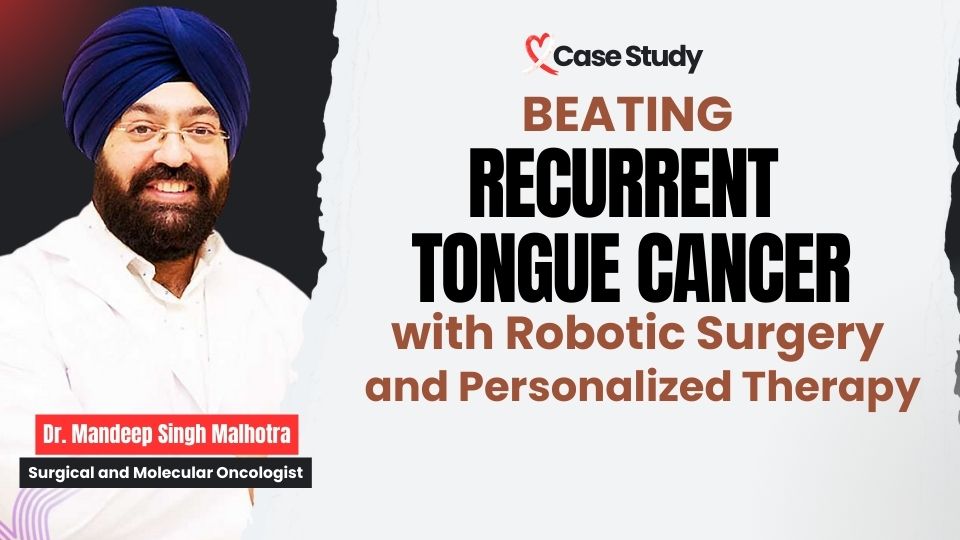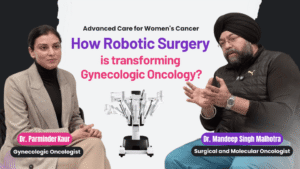A powerful and inspiring journey of Recurrent Tongue Cancer patients —
A young gentleman in his late 30s to early 40s — who faced one of the most aggressive forms of cancer: recurrent tongue cancer. His case challenged all medical norms, but through a combination of science, innovation, and faith, we witnessed a remarkable recovery.
The Diagnosis and the Challenge
This patient was initially diagnosed with tongue cancer, for which he underwent surgery, followed by chemotherapy and radiation therapy. Unfortunately, within just three months, the cancer returned — this time affecting the posterior part of the tongue and leading to the development of large lymph nodes in the neck.
Recurrent cancer in such a short time is extremely concerning. At this stage, surgery becomes complicated, and repeat radiation may not be effective and can lead to significant complications. To make matters more difficult, chemotherapy often shows limited success, and it’s unclear whether immunotherapy would be helpful — plus, it comes at a very high cost.
Turning to Advanced Cancer Diagnostics
In order to make an informed decision about the next steps, we decided to conduct two important tests:
- NGS (Next Generation Sequencing) – to understand the genetic profile of the tumor.
- RGCC (Research Genetic Cancer Center) Testing – to evaluate tumor viability by growing the patient’s cancer cells in the lab and testing them against various chemotherapy drugs, immunotherapies, and even alternative treatments, including Ayurveda.
These tests gave us a personalized roadmap for treatment — highlighting what would and wouldn’t work for his specific cancer type.
A Multidisciplinary and Integrative Approach
Based on the test results, we started a comprehensive treatment plan that included:
- Chemotherapy
- Targeted therapy
- Alternative medicine
- Ayurvedic support
Amazingly, within less than three weeks, we began seeing dramatic improvement. The neck swellings disappeared, and the overall response was far better than expected.
A Setback… and a Tough Decision
Just as things were improving, the patient developed gallstones and a gallbladder infection, which forced us to discontinue chemotherapy. At this point, we were concerned — what if the incomplete treatment wouldn’t hold up? But continuing chemo was not an option anymore.
We had to make a critical decision.
Robotic Surgery: Precision with Compassion
The patient was very clear — he did not want a disfiguring or bone-removal surgery. He wanted the most advanced and least invasive option. Respecting his wishes, we chose to go ahead with robotic surgery to remove the remaining part of the tongue tumor.
The outcome?
When the final biopsy report came back — it showed complete tumor regression. There was no cancer left.
A Miraculous Outcome
Even we, as treating doctors, were amazed. The response was beyond our expectations. It was nothing short of a miracle.
As doctors, we often say science heals. But in cases like these, we are reminded that faith, timely decisions, personalized care, and cutting-edge technology together can achieve what once seemed impossible.
Final Thoughts
This patient’s story is a reminder that no matter how complex the case, there is always hope.
I wish him all the best for a long, healthy, and fulfilling life. It was truly an honor to be part of his healing journey.



This is a powerful success story—really shows how far cancer treatment has come when cutting-edge techniques and personalized care are combined. The use of detailed diagnostics like Next-Generation Sequencing and lab-based drug sensitivity testing (RGCC) enabled choices that were tailor-made for this patient. And then choosing robotic surgery helped achieve a complete tumor regression without disfiguring surgery—it’s inspiring.
Stories like this remind us that modern cancer treatment isn’t just about standard protocols—it’s about adapting treatment to each patient’s tumor biology, preferences, and overall health.